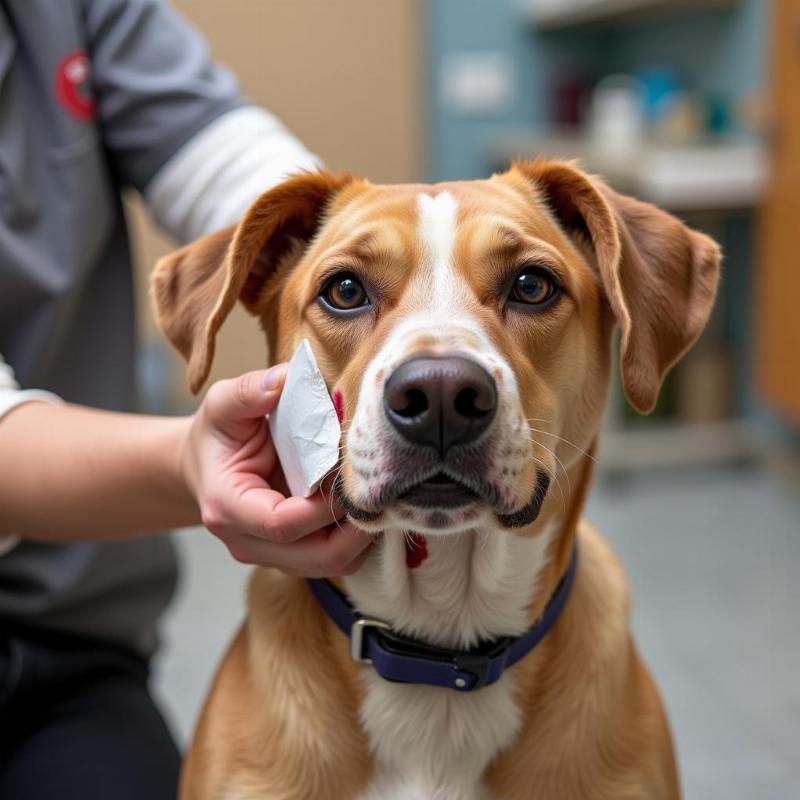A bleeding dog ear can be alarming, but it’s crucial to remain calm and assess the situation. While some bleeding may be minor and easily treated at home, other cases require immediate veterinary attention. This comprehensive guide will walk you through how to identify the cause, administer first aid, and determine when professional help is necessary for your furry friend’s bleeding ear.
Identifying the Cause of Your Dog’s Bleeding Ear
Before treating a bleeding dog ear, understanding the cause is essential. Common culprits include:
- Ear infections: Inflammation and scratching can lead to bleeding. Look for redness, swelling, and a foul odor.
- Ear mites: These tiny parasites cause intense itching and irritation, often resulting in bleeding from scratching.
- Foreign objects: Grass seeds, dirt, or even small insects can become lodged in the ear canal, causing irritation and bleeding.
- Trauma: A bite, scratch, or impact injury can cause lacerations to the ear flap or within the ear canal.
- Blood clotting disorders: While less common, underlying health issues can affect blood clotting and make even minor injuries bleed excessively.
First Aid for a Bleeding Dog Ear
If your dog’s ear is bleeding, here’s what you can do:
- Stay calm and restrain your dog: A calm approach will help both you and your dog. Use a gentle but firm hold to prevent further injury.
- Clean the area: Gently wipe away any blood or debris around the ear with a clean, damp cloth. Avoid inserting anything into the ear canal.
- Apply pressure: Use a clean gauze pad or cloth to apply direct pressure to the bleeding area. Maintain pressure for 5-10 minutes to help stop the bleeding.
- Cold compress: After the bleeding has stopped, apply a cold compress wrapped in a thin towel to help reduce swelling and pain.
 Băng bó tai chó
Băng bó tai chó
When to Seek Veterinary Care
While minor cuts and scrapes may heal on their own, some situations require immediate veterinary attention:
- Heavy bleeding: If the bleeding is profuse or doesn’t stop after applying pressure for 10 minutes.
- Deep wounds: Lacerations that penetrate through the ear flap or appear deep within the ear canal.
- Signs of infection: Redness, swelling, pus, or a foul odor indicate infection.
- Foreign object: If you suspect something is lodged in your dog’s ear.
- Lethargy or changes in behavior: If your dog seems unusually tired, weak, or in pain.
“Never try to remove a foreign object from your dog’s ear yourself,” advises Dr. Amelia Shepherd, DVM, a veterinarian based in Chicago. “This can cause further damage and potentially push the object deeper into the ear canal. Always consult a veterinarian for proper removal.”
Conclusion
Knowing how to treat a bleeding dog ear is an essential skill for any dog owner. By understanding the potential causes and following the first aid steps outlined above, you can help your furry friend feel better and avoid potential complications. Remember, if you’re ever unsure about the severity of the injury, it’s always best to err on the side of caution and seek professional veterinary care.
FAQs
- My dog keeps shaking his head. Could this cause bleeding? Yes, excessive head shaking can exacerbate ear problems and potentially lead to bleeding.
- Can I use hydrogen peroxide to clean my dog’s bleeding ear? No, hydrogen peroxide can damage delicate ear tissue. Stick to cleaning the area around the ear with a damp cloth.
- How can I prevent my dog’s ear from bleeding again? Addressing the underlying cause is crucial. Consult your veterinarian for appropriate treatment for ear infections, mites, or other issues.
- What if my dog’s ear is bleeding internally? Internal bleeding in the ear is a serious condition that requires immediate veterinary attention.
- Are certain dog breeds more prone to ear bleeding? Breeds with floppy ears, like Cocker Spaniels and Basset Hounds, are more susceptible to ear infections and other issues that can lead to bleeding.
Beautdogs.us is your premier online resource for comprehensive and engaging information on dog care, breed specifics, and product recommendations. Whether you’re a seasoned dog owner or just starting your journey, Beautdogs.us provides expert advice and valuable insights to help you provide the best possible care for your beloved companion. Contact us for personalized support at [email protected] or +1 501-555-7529.